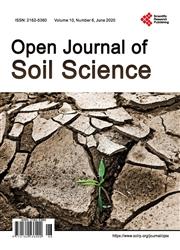Contribution of Biofertiliser (Frateuria auranta) in an Integrated Potassium Management Package on Growth of Apple Banana
引用次数: 0
Abstract
Bananas demand high amounts of potassium for optimal growth and productivity, yet deficiencies are widespread amid the low input production strategy of smallholder farmers in Uganda. Of the potassium pool in the soil, 90% -98% is unavailable for plant uptake. Judicious application of fertilisers is required to alleviate soil fertility problems complemented with manures and biofertilisers in an integrated nutrient management (INM) package. Biofertilisers such as potassium solubilising bacteria (KSB) have potential to solubilise unavailable forms of K in soil to forms that are readily absorbed by the plants. However, the added value of each component in this integrated K management package in apple bananas is not known. Therefore, an experiment was set up to quantify the relative contribution of mineral K, manure and KSB on the growth of apple bananas. Potted tissue culture plantlets of apple banana (cv. Sukali ndiizi) were used. The treatments comprised of a full factorial combination of mineral fertiliser (Muriate of potash, 60% K 2 O), animal manure and KSB (Frateuria auranta). The manure and muriate of potash were applied to supply a total of 150 kg∙K∙ha − . Soil microbiological assays were run to evaluate the contribution of indigenous microbial K solubilising activity in the soil to the experimental INM package. Data on pseudostem height, girth at collar and 30-cm height, constrained smallholder farmers.生物肥料(Frateuria auranta)对苹果香蕉生长的贡献
香蕉需要大量的钾才能达到最佳生长和生产力,但在乌干达小农的低投入生产战略中,钾缺乏现象普遍存在。在土壤中的钾库中,90% -98%不能被植物吸收。需要明智地施用肥料以缓解土壤肥力问题,并在综合营养管理(INM)一揽子计划中补充肥料和生物肥料。生物肥料,如增钾细菌(KSB)有可能将土壤中不可用的钾溶解为易于被植物吸收的形式。然而,在苹果香蕉中,这种综合钾管理包中各成分的附加值是未知的。为此,本试验旨在定量研究矿质钾、有机肥和KSB对苹果香蕉生长的相对贡献。苹果香蕉盆栽组培苗。用了Sukali ndiizi)。这些处理包括矿物肥(钾肥,60% k2o),动物粪便和KSB (Frateuria auranta)的全因子组合。施用有机肥和钾肥盐,总供给量为150 kg∙K∙ha−。进行土壤微生物学分析,以评估土壤中本地微生物溶钾活性对实验INM包的贡献。假茎高度、衣领周长和30厘米高度数据,约束小农。
本文章由计算机程序翻译,如有差异,请以英文原文为准。
求助全文
约1分钟内获得全文
求助全文

 求助内容:
求助内容: 应助结果提醒方式:
应助结果提醒方式:


